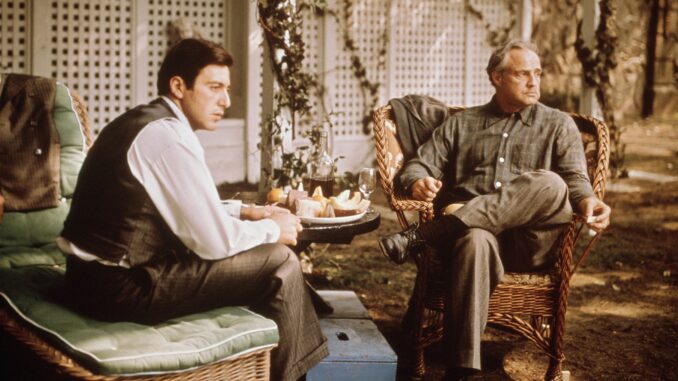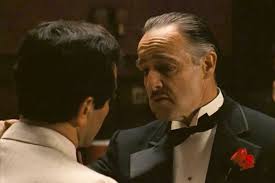
The Lessons of Michael Corleone

Happy Passover and Easter to readers who celebrate. It’s going to be a busy weekend for me, so I’ll be planning for two posts next week, with the first appearing on Tuesday or Wednesday. In the meantime, I hope you enjoy the following essay about a pair of classic American movies. Because I go on at such length below, there’s no “Great Song Suggestion” today. I’ve therefore placed the paywall about 2/3 through the essay, which is frustrating for me—because I’d love you all to read the whole thing! I hope you’ll consider converting to a paid subscription. See you next week.
In my post on Monday of this week, I described the Republican Party as having been infected by “mobster morality,” which I summarized as followed: “helping friends, harming enemies, and denying any broader commonality or shared solidarity underlying either or both. ”
I was inspired to make this claim by watching The Godfather and The Godfather, Part 2 for the first time with my teenage daughter over the past week or so. Those films are many things, including two of the greatest American movies ever made. That is widely acknowledged. Less broadly recognized is the extent to which they explore with uncommon depth the distinctive strengths and ultimately fatal instability of mobster morality. This insight can be gleaned from the movies themselves, and in particular from one decision scene in the second film. But it can be discerned with special clarity when the movies are interpreted in light of the arguments that unfold in Book 1 of Plato’s Republic.
Vito Corleone’s life is a moving tribute to mobster morality at its most admirable. In the very first scene of the first film, Vito is listening to a plea for justice from an undertaker named Amerigo Bonasera, who begins by telling Vito, and us, that he believes in America—the wider community of his adopted homeland. Yet his allegiance to the country has been undermined by the way the courts have responded to a vicious and violent attack by two young men on his once-beautiful daughter. The offenders who suffered and left her disfigured were found guilty in court but given a suspended sentence by the judge. Bonasera has come to Vito asking for vengeance in the form of a double murder.
In response, Vito says (or implies) several things. First, that murder wouldn’t be justice because Bonasera’s daughter wasn’t killed in the attack. Second, that Bonasera was foolish to place greater faith in the country’s supposedly dispassionate system of public justice (police and courts of law) than in friendship with and respect shown to a powerful private protector like Vito himself. “If you’d come to me in friendship, then the scum that ruined your daughter would be suffering this very day,” Vito said. “And if by chance an honest man like himself should make enemies, then they will become my enemies. And then they will fear you.”
That, for Vito, is the proper order of society: enemies fearing harm, loyalty and respect shown by and to friends, with family given absolute protection as the closest of all possible “friends.” Vito embodies these norms in the most honorable way possible—with justice and moderation. In the prequel sections of Part 2, we learn that as a child in Sicily, Vito’s father, mother, and brother were murdered by the local mafia chieftain. Years later, as a rising underworld figure in the United States, Vito returns to his hometown to exact a vendetta against the mafia, now an old man. The only other murder Vito commits in his early rise targets Don Fanucci, a gangster in his Lower East Side immigrant neighborhood who preys on and threatens Vito (and through him his family) and his friends.
After the latter killing, Vito becomes a “good don” who, unlike his predecessor, gains in stature by doing good deeds for friends and cultivating a reputation as someone who lashes out fiercely and fearlessly against their common enemies. As a result, Vito and his family thrived. They’re continuing to thrive decades later in the early portion of the first film—right up until Vito is targeted in an assassination attempt for resilience to do business with a man looking for a partner in drug trafficking.
Up and Down from Tribalism
Vito’s mafia ethic receives a classic defense in the opening book of Plato’s Republic by the character of Polemarchus, who famously defines justice as helping friends and harming enemies.1 That formulation would be repeated down through the centuries, receiving a powerful modern-day revival in the work of legal theorist Carl Schmitt. The view has also been sharply criticized by St. Augustine and many others, though few have surpassed the subtlety and depth of the questions and objections raised by Socrates in the Republic itself.